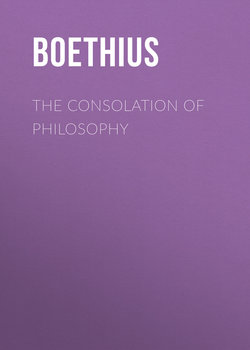The Consolation of Philosophy

Реклама. ООО «ЛитРес», ИНН: 7719571260.
Оглавление
Boethius. The Consolation of Philosophy
PREFACE
PROEM
BOOK I. THE SORROWS OF BOETHIUS
BOOK I
SONG I. Boethius' Complaint
I
SONG II. His Despondency
II
SONG III. The Mists dispelled
III
SONG IV. Nothing can subdue Virtue
IV
SONG V. Boethius' Prayer
V
SONG VI. All Things have their Needful Order
VI
SONG VII. The Perturbations of Passion
BOOK II. THE VANITY OF FORTUNE'S GIFTS
BOOK II
I
SONG I. Fortune's Malice
II
SONG II. Man's Covetousness
III
SONG III. All passes
IV
SONG IV. The Golden Mean
V
SONG V. The Former Age
VI
SONG VI. Neros' Infamy
VII
SONG VII. Glory may not last
VIII
SONG VIII. Love is Lord of all
BOOK III. TRUE HAPPINESS AND FALSE
BOOK III
I
SONG I. The Thorns of Error
II
SONG II. The Bent of Nature
III
SONG III. The Insatiableness of Avarice
IV
SONG IV. Disgrace of Honours conferred by a Tyrant
V
SONG V. Self-mastery
VI
SONG VI. True Nobility
VII
SONG VII. Pleasure's Sting
VIII
SONG VIII. Human Folly
IX
SONG IX.9. Invocation
X
SONG X. The True Light
XI
SONG XI. Reminiscence.10
XII
SONG XII. Orpheus and Eurydice
BOOK IV. GOOD AND ILL FORTUNE
BOOK IV
I
SONG I. The Soul's Flight
II
SONG II. The Bondage of Passion
III
SONG III. Circe's Cup
IV
SONG IV. The Unreasonableness of Hatred
V
SONG V. Wonder and Ignorance
VI
SONG VI. The Universal Aim
VII
SONG VII. The Hero's Path
BOOK V. FREE WILL AND GOD'S FOREKNOWLEDGE
BOOK V
I
SONG I. Chance
II
SONG II. The True Sun
III
SONG III. Truth's Paradoxes
IV
SONG IV. A Psychological Fallacy.18
V
SONG V. The Upward Look
VI
EPILOGUE
REFERENCES TO QUOTATIONS IN THE TEXT
Отрывок из книги
The book called 'The Consolation of Philosophy' was throughout the Middle Ages, and down to the beginnings of the modern epoch in the sixteenth century, the scholar's familiar companion. Few books have exercised a wider influence in their time. It has been translated into every European tongue, and into English nearly a dozen times, from King Alfred's paraphrase to the translations of Lord Preston, Causton, Ridpath, and Duncan, in the eighteenth century. The belief that what once pleased so widely must still have some charm is my excuse for attempting the present translation. The great work of Boethius, with its alternate prose and verse, skilfully fitted together like dialogue and chorus in a Greek play, is unique in literature, and has a pathetic interest from the time and circumstances of its composition. It ought not to be forgotten. Those who can go to the original will find their reward. There may be room also for a new translation in English after an interval of close on a hundred years.
Some of the editions contain a reproduction of a bust purporting to represent Boethius. Lord Preston's translation, for example, has such a portrait, which it refers to an original in marble at Rome. This I have been unable to trace, and suspect that it is apocryphal. The Hope Collection at Oxford contains a completely different portrait in a print, which gives no authority. I have ventured to use as a frontispiece a reproduction from a plaster-cast in the Ashmolean Museum, taken from an ivory diptych preserved in the Bibliotheca Quiriniana at Brescia, which represents Narius Manlius Boethius, the father of the philosopher. Portraiture of this period is so rare that it seemed that, failing a likeness of the author himself, this authentic representation of his father might have interest, as giving the consular dress and insignia of the time, and also as illustrating the decadence of contemporary art. The consul wears a richly-embroidered cloak; his right hand holds a staff surmounted by the Roman eagle, his left the mappa circensis, or napkin used for starting the races in the circus; at his feet are palms and bags of money—prizes for the victors in the games. For permission to use this cast my thanks are due to the authorities of the Ashmolean Museum, as also to Mr. T.W. Jackson, Curator of the Hope Collection, who first called my attention to its existence.
.....
'First, then, wilt thou suffer me by a few questions to make some attempt to test the state of thy mind, that I may learn in what way to set about thy cure?'
'Ask what thou wilt,' said I, 'for I will answer whatever questions thou choosest to put.'
.....